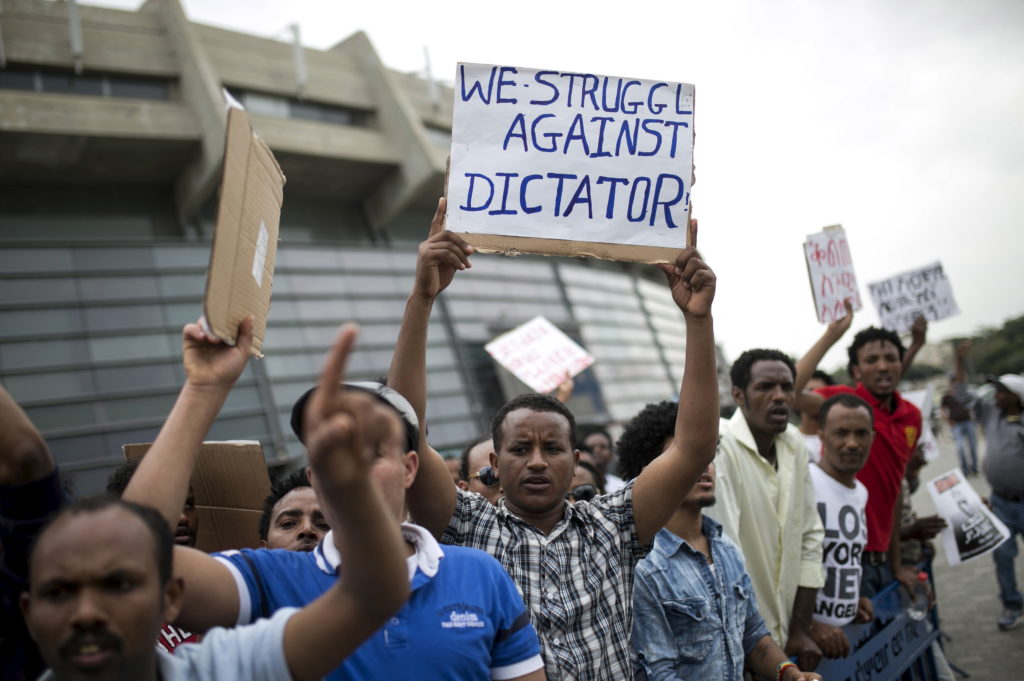
For the last two decades every misrule committed by the ruling regime in Eritrea has been justified as part of the unavoidable costs of the unsettled border conflict and Ethiopia’s occupation of Eritrean territories after the bloody border war of 1998-2000 followed by 18 years of standstill. Over their impatient Waiting for Godot, Eritreans have been deprived of their liberty, human dignity, and prosperity: the ratified constitution was shelved; military service made indefinite; businesses kept on hold; construction was banned; schools have been militarized; the only university was closed; the country has turned into a penitentiary state with numberless underground prisons, and the list goes on.
Then to everyone’s surprise Godot arrived in July last year.
The peace deal with Ethiopia marked the culmination of an indefinite waiting. This signaled the crumbling of a realm built on a foundation of excuses. It was further reinforced by the lifting of U.N. sanctions on Eritrea and allowing the country to join the U.N. Human Rights Council, effectively ending any possible excuses the regime could produce.
Many Eritreans who have visited their homeland after the peace deal have shared an uncanny observation: a widely felt sense of zombification among the citizenry. That is a perfect recipe for the regime to continue its repression unchallenged.
Any expectation that Afwerki’s regime would follow the positive example of Ethiopian Prime Minister Abiy Ahmed’s reformist agenda has faded. After the peace deal, most countries and stakeholders hoped to hear that the longstanding Eritrean mass exodus would immediately end. As unpublished reports from Ethiopian Administration for Refugee & Returnee Affairs (ARRA) indicate, when the Ethiopian borders were opened in September, between 1,200 and 1,600 Eritreans were arriving at Ethiopian refugee camps each week until the borders were closed on Christmas.
In the fast-changing geopolitical developments in the region, major powers are aligning with the repressive regime and it leaves the already tarnished Eritreans at a worse stage. The only meaningful resistance (at least visible) facing the Eritrean regime comes from the very large Eritrean diaspora community that serves as an offshore opposition.
Eritreans are saying “Enough”
Since January, Eritrean social media, later amplified by the diaspora-based media that reach the country, has been generating a flood of calls to stand together in the face of the growing repression. Many have declared unanimously #EnoughIsEnough. This continued in mid-February as activists began recording short videos of themselves addressing outstanding issues and challenging others to follow suit. The challenge quickly went viral as leading artists (who quickly composed songs,) religious leaders from all faiths, children of prisoners of conscience, and others from all walks of life joined the campaign.
Every day many Eritreans in the diaspora are posting messages on Facebook, YouTube, and Twitter that receive tens of thousands of views and hundreds of shares. And notably, it’s not just the usual known faces. In this ongoing campaign, ordinary citizens—young men and women—are emerging and claiming ownership not shown before. Many are not waiting to be called, but rather are challenging themselves to overcome fear and share their views. The messages are being sent in major languages like Tigrinya, Arabic, and English.
Others are lobbying to highlight the imminent peril as Eritrea seems to have been forgotten since the rapprochement with Ethiopia raised hopes. As Afwerki continues to sign shady deals with Ethiopia while keeping even his subordinates in the dark, the diaspora has been sharing its dissatisfaction openly, and warning about the possible long-term negative consequences. Eritreans in London and Washington, D.C., have held rallies in front of the Ethiopian embassy calling on Ethiopian authorities to respect Eritrean sovereignty and stop dealing with the unelected leader in Eritrea.
The ongoing social media-driven challenges and various peaceful protests are significant at this crucial juncture. Never did the Eritrean diaspora community send such a unified message before.
In their delivery and framing, the messages cover a range of outstanding issues. Many have been demanding of the Eritrean regime the immediate demarcation of borders, a restating of the rule of law, and the unconditional release of prisoners of conscience. Others don’t see the utility of calling on a “deaf” regime to introduce reforms, but instead are urging fellow Eritreans to bridge their differences and channel efforts to dismantle the regime. Religious leaders from both faiths are calling for unity and expressing their support. Yet others are urging the silent majority to come out and show their rage. Indeed, many, including former supporters of the regime are coming out and openly dissociating themselves.
Eritreans inside the country have long resorted to indirect ways of accessing information, either through the diaspora-based media outlets or social media. The state has taken aggressive action to disrupt this unauthorized communication, since it’s succeeding in bypassing the regime’s control of information and discrediting its narrative.
Now, thanks to the widespread social media-driven campaign, amplified through other outlets, Eritreans can communicate with one another despite the obvious challenges. This has built confidence and sent a strong signal of support to Eritreans under siege from their own government inside the country.
Eritrean diaspora: ‘No, we’re not’

Over the last few years, the Eritrean regime has been steadily losing control of the diaspora community, estimated a third of the country’s population, which had offered a strong base of support since the war of independence. Thanks to the continued lobbying of activists, many countries have outlawed the 2 percent diaspora tax, which is levied by the government on other state’s consular offices if citizens need any service from the state. The previous base of support has drastically dwindled; the yearly diaspora festivals are diminishing, or else they are facing fierce resistance among the Eritrean opposition to the extent that they keep their locations secret until the last minute. The few who had genuinely considered the regime’s longstanding excuses for repression as legitimate have come to learn the hard way that they were only pretexts to extend its rule.
By installing fear and mistrust, and more importantly by creating a false narrative that tapped into every Eritrean family, Afwerki’s regime succeeded in undermining and silencing potential opposition. Despite the huge outward flow of refugees, the tradition among Eritreans in the diaspora has been to keep quiet in fear of possible retaliation to family members at home. Some even believed that the regime’s security apparatus was capable of targeting dissidents in the West. This unfounded fear has largely dissipated as many Eritreans living abroad are now showing their faces and openly recording messages that discredit the regime.
This has opened the door for many previously silenced citizens to share their personal stories and fill the information gap. This is an important development, breaking the long tradition of Eritreans being shy to share their personal stories.
The Eritrean regime, meanwhile, has been striving to create the impression that the whole Eritrean diaspora community strongly supports its policies. This message has been hammered through the state media and seminars inside the country. The prime targets of Eritrean state media propaganda are people in the Eritrean diaspora who have an inflated self-image due to their portrayals as the sole guardians of the nation. As a result, many Eritreans inside the country have characterized the majority in the diaspora as accomplices of the regime and its only lifeline. However, since the rapprochement with Ethiopia, the criticism of the regime coming from the diaspora, and messages of solidarity with people in Eritrea, have helped forge trust and support between the two, after a long period of disconnection. Many in the diaspora have sent messages of encouragement to those remaining in Eritrea, with assurances that they feel and share their pains.
The new wave of challenges is unifying the widely scattered Eritrean opposition forces that heretofore have been divided along ethnic, religious and gender lines, through years of struggle. By disregarding the traditional hierarchy of opposition parties or civic organizations, a new breed of youth, empowered by social media, has come to the forefront, no longer afraid to take their affairs into their own hands. The fact that the opposition has become decentered allows everyone to claim participation. For the many Eritreans who have been subjected to extreme control, the new trend empowers everyone as his or her own agent.
Unlike Eritreans who appear on state media parroting the same expression fed by the media, the new challenges emerging on social media have shown great variety in terms of delivery, packaging, and creativity. Despite stating similar messages, the originality in each message has helped drive up audience penetration, something that’s reflected in the great number of views and shares many videos have been receiving.
The #EnoughIsEnough campaign message has reached Eritrea. Some recorded a video clip in Asmara’s streets expressing their support and shared it on social media. Rather than galvanizing protests inside the country, which would draw a lethal response by the state, the social media campaign is succeeding in showing defiance and solidarity. This provides a direct and unmistakable challenge to the Eritrean regime, which gets very unsettled by any act of unmediated communication between the diaspora and Eritreans inside the country.
For the diaspora-based regime cheerleaders who have long dominated some social media platforms, particularly Twitter, the new trend is unsettling, as evidenced by their accusations that Twitter is “shadow banning,” fully or partially blocking contents from online visibility.
Social media has obvious limitations as the most it can do is to facilitate and create a platform for communication. Yet, it’s a major accomplishment to be able to unify the widely scattered Eritrean voices. It has allowed them to talk to one another horizontally, as opposed to the suffocating top-down approach. This in turn has provided assurance that Eritreans are indeed capable of unsettling their repressive regime at home if well-coordinated. So far, the major achievement has been to demystify the seemingly “untouchable” regime and conquer the pervasive fear. There could not be any defeating moment when such a closed regime is suddenly exposed that it is indeed very vulnerable and had only ruled through fear. But the protests will need further impetus to reach the next level.
Abraham T. Zere is executive director of PEN Eritrea in exile. Among others, his work has been published in The Guardian, The Independent, Al Jazeera English, Africa is A Country, Dissent Magazine and Index on Censorship Magazine. Follow him on Twitter @abraham_zere
